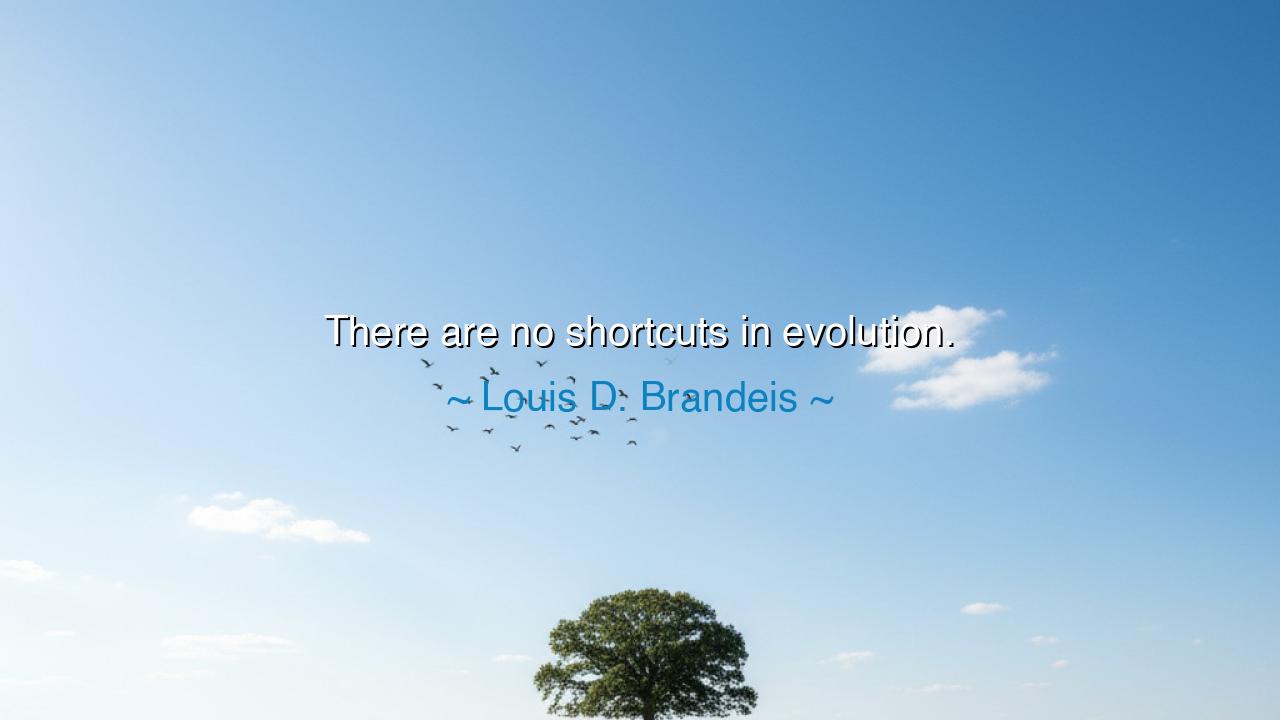
There are no shortcuts in evolution.






"There are no shortcuts in evolution." These words from Louis D. Brandeis, a visionary in the realm of law and social reform, offer a timeless truth that applies not only to the natural world but to every aspect of life, from personal growth to societal progress. Evolution, in its essence, is a slow and often painful process of change and adaptation, driven by time and effort. Brandeis’s statement emphasizes the idea that, though we may yearn for quick fixes, true growth—whether in the natural world or in human endeavors—requires perseverance and gradual transformation. Shortcuts may provide fleeting success, but lasting change and progress are achieved only through dedication and commitment.
In the ancient world, the great philosophers understood that the path to wisdom was a long and laborious one. Socrates famously said, “The unexamined life is not worth living.” This statement reveals a profound truth about personal evolution: wisdom does not come from shortcuts or easy answers, but from a deep and ongoing process of self-examination. Socrates’ life was a testament to the power of asking difficult questions, of challenging oneself to evolve over time through reflection and discourse. Similarly, Brandeis’s quote calls us to embrace the process of evolution, whether in our own lives, our societies, or the natural world, recognizing that it cannot be rushed or bypassed.
Consider the example of Darwin’s theory of evolution, which serves as the very embodiment of gradual, persistent change. Charles Darwin spent years observing nature, meticulously gathering data, and developing his theory of natural selection. He did not seek shortcuts to understanding life’s diversity; instead, he embraced the slow and painstaking process of gathering facts, testing hypotheses, and refining his ideas. His work revolutionized the way we understand life on Earth, but it was not the result of an overnight epiphany or a quick breakthrough—it was the product of relentless observation and hard work. Darwin’s example aligns perfectly with Brandeis’s principle that true evolution takes time and cannot be achieved through shortcuts.
This same principle applies to the progress of societies. Martin Luther King Jr., for instance, did not achieve the monumental changes of the Civil Rights Movement through shortcuts, but through years of struggle, non-violent protest, and moral courage. The process of social evolution—of moving toward justice and equality—required steadfast commitment to the cause, even in the face of violence and oppression. Shortcuts might have promised immediate results, but true change was achieved through a slow, difficult, and often painful evolution of hearts, minds, and systems.
Moreover, Brandeis’s insight resonates in the personal journey of growth and self-improvement. In our own lives, we often seek quick fixes: instant gratification, shortcuts to success, or an easy route to happiness. Yet, true personal evolution—whether in terms of wisdom, character, or skills—requires patience and effort. Think of Michelangelo, who spent years chiseling away at his masterpieces. The David, for example, was not created through haste but through meticulous labor, patience, and dedication. His art stands as a testament to the idea that great things are achieved not through shortcuts but through gradual, deliberate effort.
The lesson Brandeis imparts is one of acceptance and humility. We must accept that the processes of change—whether in evolution, personal growth, or societal progress—are not quick or easy. Immediate results may seem alluring, but they often come at a cost. The shallow roots of quick success can lead to instability and regression, while the deep roots of slow, deliberate progress offer a foundation that can withstand the challenges of time. True evolution demands perseverance, dedication, and patience, and it is through these qualities that we truly grow.
In our own lives, we must recognize the truth in Brandeis's words: there are no shortcuts to meaningful growth. Whether we are striving for success in our careers, working to build better relationships, or seeking personal enlightenment, we must remember that real, lasting progress is earned through time and effort. The mountains of difficulty we face are not obstacles to be avoided, but steps in the slow, steady ascent toward our highest potential. Let us embrace the challenge of evolution, understanding that the reward of true growth is not the instant gratification of a shortcut but the lasting fulfillment of achieving our deepest goals through sustained effort.
So, let us move forward with the knowledge that true change—whether in our lives or in the world around us—requires patience, perseverance, and a willingness to face the slow and steady path of evolution. Let us reject the temptation of shortcuts and instead embrace the slow, but sure, progress that comes from hard work and dedication. The journey of evolution is long, but it is through this journey that we discover the fullness of who we are meant to become. Embrace the process, for in time, we will reach the heights we are destined for.






AAdministratorAdministrator
Welcome, honored guests. Please leave a comment, we will respond soon